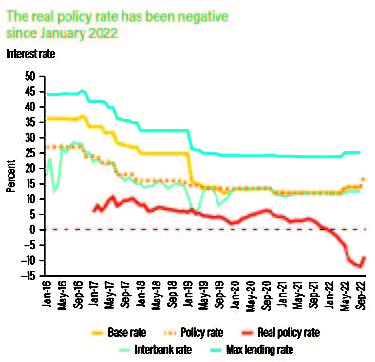IMF calls on RBM to tighten policy
The International Monetary Fund (IMF) has challenged the Reserve Bank of Malawi (RBM) to adjust the policy rate in view of intensifying inflationary pressures to achieve price stability.
In its Regional Economic Outlook for Sub-Saharan Africa published on Friday, it said the monetary policy should be steered cautiously until inflation, currently at 26.7 percent, is firmly on a downward trajectory and projected to return to the central bank’s target range.

Reads IMF the report: “In countries like Malawi, growth in reserve money continues to exceed nominal gross domestic product [GDP] growth, a situation which elevates inflationary pressures.
“Policymakers, thus, need to adjust the pace of monetary policy tightening to both the level and trajectory of inflation, in close coordination with fiscal policy, which can also tame domestic demand pressures where they exist and contain money growth.”
In view of rising inflation since the second quarter of last year, RBM tightened the monetary policy by raising the policy rate from 12 to 18 percent in October last year.

Meanwhile, inflation rate has continued to rise currently at 26.7 percent as of February this year, according to the National Statistical Office.
But economic statistician Alick Nyasulu said in an interview yesterday that this kind of approach to taming inflation only works in developed countries not in Sub-Saharan Africa or other developing nations.
He said: “This is a one size fits all approach to taming inflation. Tightening monetary policy means increasing interest rates which makes access to capital difficult and puts our economies on decline.
“We need to deal with rising debt which is a big threat to government finance and a channel through which rates actually increase.”
Meanwhile, economist Exley Silumbu has said that price stability is critical, observing that high prices are dealing a heavy blow to consumers and enterprises.
He, however, noted that inflationary pressures in Malawi are not pushed by growth in money supply, but low export and manufacturing base, saying addressing these would help tame inflation and stabilise prices in the short to medium-term.
“The inflationary pressures we are facing are due to the fact that the supply side is sort of neglected. We do not have much to export and gain competitiveness as is theoretically purported,” said Silumbu.
RBM spokesperson Ralph Tseka was yet to respond to our questions by press time at 5pm, but in its Monetary Policy Committee Statement in February, the RBM indicated that the inflation outlook remains under pressure.





